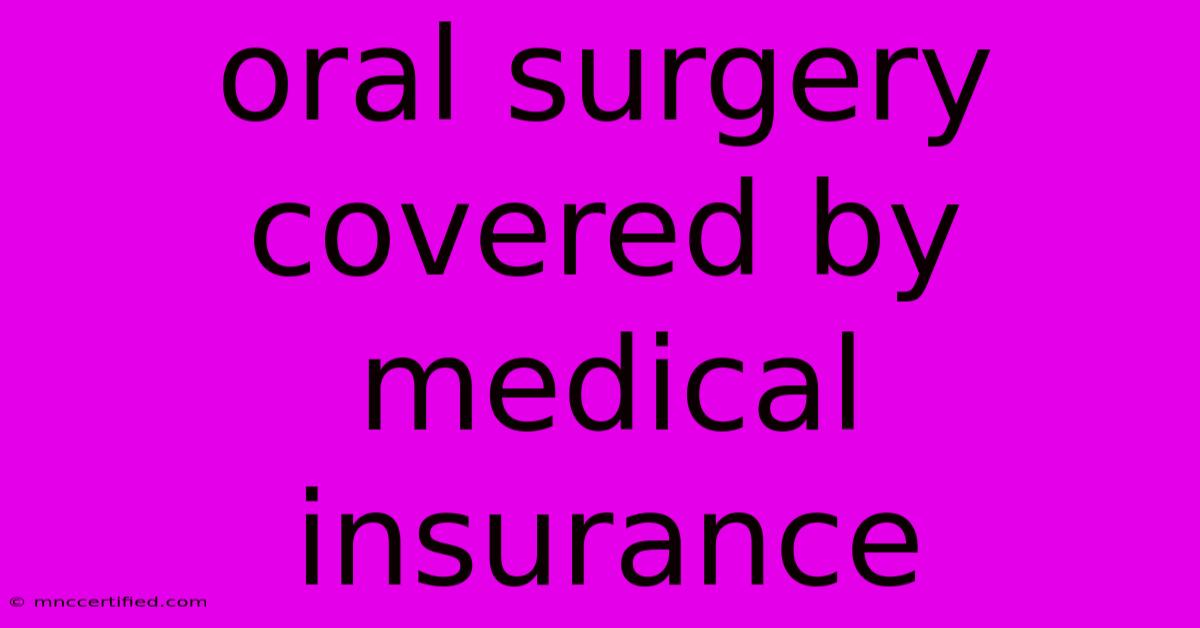Oral Surgery Covered By Medical Insurance

Table of Contents
Is Oral Surgery Covered by Medical Insurance? A Comprehensive Guide
Oral surgery, from wisdom teeth removal to bone grafts, can be a significant financial burden. Thankfully, many medical insurance plans offer coverage for these procedures. However, understanding your coverage can be tricky, as policies vary widely. This comprehensive guide will demystify oral surgery insurance coverage, helping you navigate the process with ease.
What Does Your Insurance Plan Cover?
The first step is to meticulously review your insurance policy. Pay close attention to the following key aspects:
- Dental vs. Medical Coverage: Some procedures, like wisdom tooth removal, may fall under both dental and medical insurance. It's crucial to understand which plan will cover the procedure in your case.
- Specific Procedures: Note the specific oral surgeries included in your plan. This might include wisdom tooth removal, implants, bone grafts, or jaw surgery.
- Pre-Authorization: Many plans require pre-authorization for oral surgery. This involves obtaining approval from your insurer before scheduling the procedure.
- Co-pays and Deductibles: Understand your co-pay and deductible for oral surgery. This will help you estimate your out-of-pocket expenses.
- Network Providers: Ensure your chosen oral surgeon is in your insurance network. Out-of-network providers may result in higher costs.
Key Factors Influencing Coverage
Several factors influence your insurance coverage for oral surgery:
- Medical Necessity: Procedures must be medically necessary, not purely cosmetic. Your surgeon will document the medical justification for the procedure.
- Prior Authorization: As mentioned earlier, most plans require pre-authorization. Failure to obtain this can lead to denied claims.
- Policy Exclusions: Be aware of any specific exclusions in your policy. For example, some plans may not cover procedures performed for cosmetic reasons.
- Waiting Periods: Some plans have waiting periods before coverage kicks in for certain procedures.
Maximizing Your Coverage
Here are some practical tips for maximizing your coverage:
- Consult with Your Dentist: Discuss your insurance plan with your dentist and ask for their insights on procedures and coverage.
- Choose an In-Network Provider: Opting for an in-network provider can significantly reduce out-of-pocket costs.
- Explore Payment Options: Some insurance providers offer payment plans or financing options to ease financial burdens.
- Negotiate with Providers: While not always feasible, you can negotiate with your surgeon or provider for discounted fees.
- Consider Alternative Treatment Options: If your desired procedure isn't covered, explore alternative treatment options that may be covered.
Seeking Clarification: Don't Hesitate to Ask
Don't hesitate to contact your insurance provider directly for clarification on specific procedures or coverage details. They are your primary resource for accurate information.
In conclusion, understanding your insurance coverage for oral surgery is essential for financial preparedness. By carefully reviewing your policy, understanding key factors, and taking proactive steps, you can navigate the process confidently and make informed decisions about your treatment. Remember, open communication with your dentist and insurance provider is crucial for ensuring smooth and financially-sound oral surgery outcomes.

Thank you for visiting our website wich cover about Oral Surgery Covered By Medical Insurance. We hope the information provided has been useful to you. Feel free to contact us if you have any questions or need further assistance. See you next time and dont miss to bookmark.
Featured Posts
-
Does Insurance Cover Capsular Contracture
Nov 07, 2024
-
Free Nba Stream Warriors Vs Celtics Today
Nov 07, 2024
-
List Of Insurance Marketing Organizations
Nov 07, 2024
-
Woodson Mgbako Galloway On Ius Siue Win
Nov 07, 2024
-
Barcelona Vs Red Star Lineups And Predictions
Nov 07, 2024